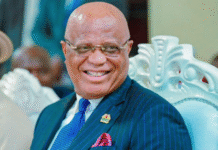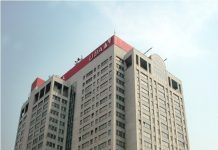President Muhammadu Buhari and seven other African presidents will today inaugurate the Dangote Refinery located on the Lekki Free Zone, along the coast of Atlantic Ocean.
The 650,000 barrels per day (bpd) facility is expected to be the biggest single refinery in the world and may end petrol smuggling in Nigeria
According to ThisDay, the presidents of Togo, Gnassingbé Eyadéma; Ghana, Nana Akufo-Addo; Senegal, Macky Sall; Niger Republic, Mohamed Bazoum; and Chad, Mahamat Déby are expected at the historic commissioning while President Paul Kagame of Rwanda, would present his goodwill message virtually.
Others expected at the inauguration from Nigeria include the president-elect, Mr. Bola Tinubu, the group chief executive officer of the Nigerian National Petroleum Company Limited (NNPC), Mr. Mele Kyari; chief executive officer, Nigerian Upstream Petroleum Regulatory Commission (NUPRC), Mr. Gbenga Komolafe; and chief executive officer, Nigerian Midstream and Downstream Petroleum Regulatory Authority (NMDPRA), Mr. Ahmed Farouk.
Others are permanent secretary, ministry of petroleum resources, Mr. Gabriel Aduda; governor of the Central Bank of Nigeria (CBN), Mr. Godwin Emefiele; minister of finance, budget and national planning, Mrs. Zainab Ahmed; minister of industry, trade and investment, Mr. Adeniyi Adebayo; and Femi Otedola, among others.
Representatives of downstream associations, including Major Oil Marketers Association of Nigeria (MOMAN); Depot and Petroleum Products Marketers Association of Nigeria (DAPPMAN); and Independent Petroleum Marketers Association of Nigeria (IPMAN) were also invited.
The refinery’s project fact sheet released by Dangote Group revealed that the facility covers a land area of approximately 2,635 hectares, which is seven times the size of Victoria Island.
The refinery is the biggest refinery in Africa and also the biggest single-train refinery in the world. A single-train refinery uses an integrated distillation unit or one Crude Distillation Unit (CDU) to refine crude oil into various petroleum products, as against the use of multiple distillation units by big refineries.
Due to the large capacity of the refinery, its pipeline infrastructure is the largest anywhere in the world, with 1,100 kilometres to handle three billion Standard Cubic Feet per day (Scf/d) of gas.
The refinery has a 435MW-capacity power plant that is able to meet the total power requirement of Ibadan Electricity Distribution Company (IBEDC).
The refinery has the capacity to meet 100 per cent of the Nigerian requirement of all refined petroleum products, such as petrol – 53 million litres per day; diesel – 34 million litres per day; kerosene – 10 million litres per day; and Aviation Jet, two million litres per day. There is also surplus of each of these products for export.
Designed for 100 per cent Nigerian crude with flexibility to process other crudes, the refinery has a self-sufficient marine facility with ability for freight optimisation and also has largest single order of 5 SPMs anywhere in the world.
The refining plant has been described widely as a legacy project that will see Nigeria netting $21 billion per annum.
The company said diesel and gasoline products from the refinery would conform to Euro V specifications.
“The refinery design complies with World Bank, US EPA, European emission norms and Department of Petroleum Resources (DPR) emission/effluent norms. State-of-the-art technology. Designed to process large variety of crudes, including many of the African crudes, some of the Middle Eastern crudes and the US Light Tight Oil,” the group stated.
As the refinery comes on stream, there are concerns that Nigerians may end up buying petroleum products at higher price.
Experts say while the new refinery breaks the monopoly in the sector, pricing mechanism would have to change.
The former president of the Chartered Institute of Bankers of Nigeria (CIBN), Prof Segun Ajibola described the new refinery as the end of an era in many respects.
According to him, the development broke the government monopoly in local oil refining as the existing four oil refineries are government owned, with a myriad of institutional challenges ranging from corruption, lack of accountability, poor maintenance culture, economic rent syndrome, among other challenges.
“It should reduce importation of refined products and conserve foreign exchange as well. The Dangote Refinery, which is a wholly private sector driven initiative provides a good template for assessing operating efficiency in petroleum refining business. As a profit motivated investment, Dangote is expected to shake off the current burdens carried by the moribund local refineries.
“With an optimal operating template, the refinery is expected to change some narratives in this segment of the oil and gas industry. If Dangote Refinery turns out to be a success story, it will attract investors to the industry. By and large, government involvement in oil refining may become less and less significant in the country,” he said.
Ajibola however said pricing may become an issue, especially at the take-off stage, depending on the operating cost of the refinery.
According to him, Dangote may price its products commercially, devoid of subsidy.
Ajibola said, on the short run, contribution to national output and income, employment generation, tax revenue; foreign exchange earning potentials from export of refined products to especially the neighboring countries would be assured.
For that to happen, he said unless economies of scale drives down unit cost, Nigerians may have to make do with a higher than existing price of the products from Dangote Refinery.
Partner at PWC, Mr. Habeeb Jaiyeola said being a private business, which is expected to yield returns for its investors, there is a need to ensure the enabling environment exists to enable the refinery to thrive.
Speaking in an interview with The Guardian, Jaiyeola said the downstream sector must be fully deregulated for reasonable returns on investment, as the shareholders are not restricted by regulations.
“It is built in a free trade zone, the refinery is therefore able to seek markets outside Nigeria as well,” he said.






















































